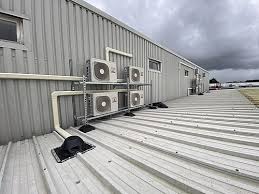
Indoor air quality (IAQ) is crucial for maintaining a healthy living environment, and in Dorset, it’s no different. Whether you live in a bustling town or a quiet countryside area, the air inside your home or workplace can affect your health and wellbeing. Poor indoor air quality can contribute to respiratory issues, allergies, and other health concerns. As people spend more time indoors, especially during the colder months, understanding and improving IAQ has become a priority. This article explores the importance of indoor air quality in Dorset, common pollutants, and practical steps to improve the air you breathe.
The Importance of Indoor Air Quality
The air inside your home can be far more polluted than the air outdoors. Common indoor pollutants include dust, mold, pet dander, volatile organic compounds (VOCs), carbon monoxide, and nitrogen dioxide. These pollutants can lead to a range of health problems, including asthma, allergies, headaches, and even long-term respiratory conditions. Improving indoor air quality is essential for reducing these risks and promoting better overall health for everyone in the household.
For residents of Dorset, who may be living in older homes or rural areas, ensuring good indoor air quality can be even more challenging. Older homes, for example, may not have the best insulation or ventilation, which can trap pollutants indoors. Additionally, Dorset’s damp climate can contribute to mold and mildew growth, which can further affect air quality.
Common Indoor Pollutants in Dorset Homes
-
Dust and Particulate Matter: Dust is one of the most common indoor pollutants, especially in homes with pets or in areas with a lot of outdoor activities. Dust particles can trigger asthma or allergy symptoms and are commonly found in carpets, bedding, and other soft furnishings.
-
Mold and Mildew: Due to Dorset’s relatively high humidity levels, mold can be a significant concern. Mold thrives in damp, poorly ventilated spaces, such as bathrooms, kitchens, and basements. Mold spores can cause respiratory issues and aggravate asthma symptoms.
-
Volatile Organic Compounds (VOCs): VOCs are emitted by many household products, such as paints, cleaning products, air fresheners, and furniture. Prolonged exposure to high levels of VOCs can cause headaches, dizziness, and long-term health problems.
-
Carbon Monoxide: A colourless, odorless gas, carbon monoxide can be deadly if not detected. It is produced by malfunctioning appliances, such as gas heaters, stoves, and fireplaces. Ensuring these appliances are regularly serviced is vital to avoiding carbon monoxide buildup.
-
Pet Dander: In households with pets, dander can accumulate in carpets, upholstery, and bedding. Pet dander is a common trigger for allergic reactions and asthma attacks.
Steps to Improve Indoor Air Quality in Dorset
-
Ventilation: Proper ventilation is one of the most effective ways to improve indoor air quality. Ensure that your home is well-ventilated by opening windows when possible and using exhaust fans in kitchens and bathrooms. Consider investing in an air exchange system or air purifiers to enhance airflow and reduce indoor pollution.
-
Regular Cleaning: Regular cleaning, including dusting, vacuuming, and washing bedding, is essential for reducing dust and allergens in the home. Using a vacuum with a HEPA filter can help trap fine dust particles and prevent them from circulating back into the air.
-
Control Humidity Levels: Keep humidity levels between 30-50% to prevent mold and mildew growth. You can use a dehumidifier in damp areas, such as basements or bathrooms, and make sure that any leaks are repaired promptly to avoid water damage.
-
Use Non-Toxic Cleaning Products: Opt for natural cleaning products that don’t release harmful chemicals into the air. Avoid air fresheners that contain VOCs, and choose fragrance-free or low-VOC products whenever possible.
-
Air Purifiers: Invest in a high-quality air purifier to remove airborne particles, such as dust, pollen, and pet dander. Look for models with HEPA filters for maximum effectiveness.
-
Regular Maintenance of Appliances: Ensure that appliances like gas heaters, stoves, and fireplaces are regularly serviced and maintained to prevent carbon monoxide buildup. Installing a carbon monoxide detector is a good safety measure.
-
Use Houseplants: Certain houseplants, such as spider plants and peace lilies, are known for their ability to absorb toxins and purify indoor air. These can be a natural way to improve air quality while also adding a touch of greenery to your home.
The Role of Local Authorities and Experts
In Dorset, local councils and environmental health agencies often provide resources and advice on improving indoor air quality. Some companies in Dorset specialize in air quality testing, which can identify specific pollutants in your home. These experts can help you understand your indoor environment better and recommend tailored solutions to improve air quality.
Conclusion
Indoor air quality in Dorset, as in any location, directly impacts the health and well-being of its residents. By understanding common indoor pollutants and taking steps to improve ventilation, humidity control, and regular cleaning, you can create a healthier environment at home. With the right strategies and the help of local experts, you can ensure that the air you breathe indoors is clean and safe for you and your family.
Investing in better indoor air quality is not just about comfort—it’s about safeguarding your health for years to come.



Leave a Reply